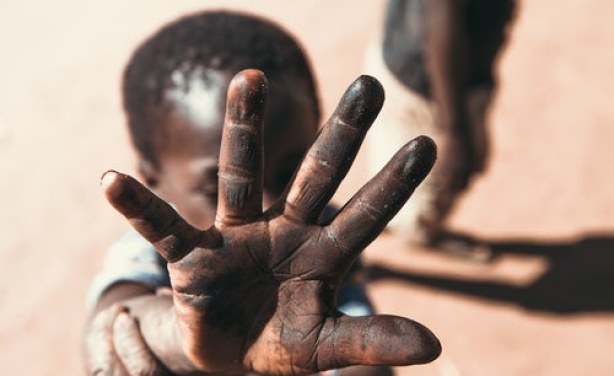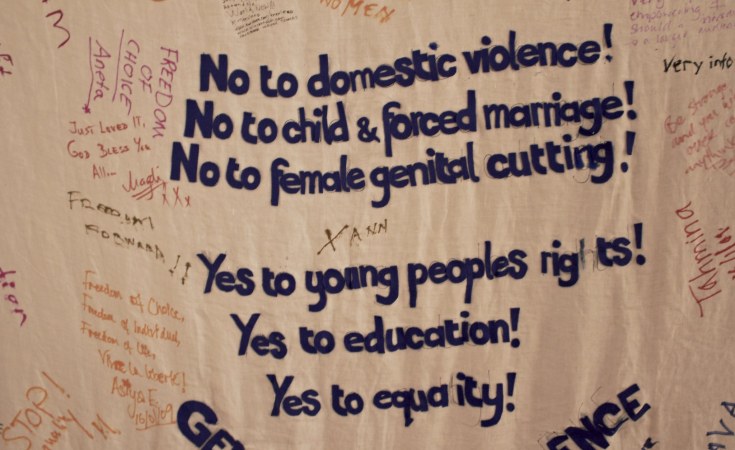OPINION
UN Aims at People-Centered Governance in a Post-Pandemic World

A rescued boat woman and her two children eat some welcome food at a centre in Kuala Cangkoi, Indonesia. The UN urges 'people-centred' approach to migrants and refugees in Southeast Asia.
UNHCR
KATHMANDU, Nepal, Apr 29 2022 (IPS) - The recently disseminated Zero Draft Ministerial Declaration of the High-Level Political Forum on Sustainable Development (HLPF)– the main UN event to track the member states’ progress to achieve the Agenda 2030 slated to be held in the first half of July– is a disappointment.
For all its comprehensiveness, the document neglected to mention one of the most significant elements that could help the world navigate the next pandemic while successfully tackling climate change and biodiversity loss and excruciating levels of inequalities.
It was in July 2020 when the UN Secretary General Antonio Guterres delivered the 18th Nelson Mandela Annual Lecture, an important speech focusing on eliminating inequalities and injustices.
It is also where the idea of a New Social Contract emerged strongly.
Seen as an indispensable antidote against raising inequalities and injustices that the pandemic both exposed and further expanded, the Secretary General was not only remarkable for recalling the sins of colonialism perpetuated by Europeans like him in the past.
He was also bold for proposing a “New Social Contract, between Governments, people, civil society, business and more, must integrate employment, sustainable development and social protection, based on equal rights and opportunities for all”.
The concept of reinventing the social contract wasn’t’ particularly new in truth.
The United Nations Development Programme (UNDP) Oslo Governance Centre (OGC), the Friedrich-Ebert- Stiftung (FES) in Berlin and New York, the Julian J. Studley Fund of the Graduate Program of International Affairs at The New School had been working on a global research study on resilient social contracts.
The outcome of this research was “Forging Resilient Social Contracts: Preventing Violent Conflict and Sustaining Peace, an11-country research and policy dialogue” that looked at the drivers that can either lead to stability and shared prosperity or the opposite, more insecurity and a continued state of violence.
The OECD has been also looking at the issue of state’s legitimacy with a groundbreaking report in 2010, The State’s Legitimacy in Fragile Situations unpacking complexity, a document that highlighted the risks of thinking from a western only perspective while supporting the extremely complex process of nation building.
Hybridity forms of governance that rely on local contexts and traditions, were highlighted as promising, though certainly not perfect, spaces of decision making, able to effectively hold together elements of bottom up decision making.
With the idea of top down nation building projects disintegrating following the Afghan’s debacle, strengthening local legitimacy is turning again to the fore.
Without it, it is impossible to shape and deliver effective and inclusive institutions that are so important now more than ever and, as to speak, not only in traditionally fragile political systems.
That’s why Guterres’s lecture in 2020 was so transformational because he was able to shift the focus on the social contract from a narrow peace building frame related to developing nations emerging from conflicts to a much broader context that significantly affects also more established democracies.
The stress and tensions that democratic systems have been experiencing in the last decade are supporting dynamics that risk to tear apart the fabric of many prosperous nations founded on a liberal political system.
Yet the Zero Draft Ministerial Declaration seems to totally forget the day-to-day relevance of establishing a new social contract, a new model based on civic engagement and people’s participation where citizens co-own the process of policy making.
Is this happening because the matter in discussion is so sensitive that some members of the United Nations might feel uneasy about getting engaged in a serious discussion about people’s involvement in shaping the public good?
For example the draft just mentions the role of Voluntary Local Review, the central process around which the SDGs can be localized, a dynamic that has been recognized as central to advance the overall Agenda 2030 and instrumental to build a new civic rapport between the citizenry and the state.
On the positive side, at least there is a mention of the UN Youth 2030, the global youth blue print that is supposed to play a big role in advancing a UN system that is more youth centered.
It is not that there is not enough discussions on partnerships, an essential element if we are serious about rethinking the process of decision making from the ground up.
For example, The Mexico Partnership Forum held in Merida on 17-18 March 2022, served as a “platform to strengthen engagement and relationships across all relevant stakeholders and sectors, while building back better from COVID-19, leading to more transformational whole-of-society approach to partnerships for advancing SDGs in Mexico”.
In another instance, the United Nations Department of Economic and Social Affairs, the International Development Law Organization, and the Government of Italy are organizing the SDG 16 Conference 2022, People-Centered Governance in Post Pandemic World that was held from 21 to 22 April.
In addition, we should not forget that the UN Habitat promoted New Urban Agenda is based on stronger level of collaborations and partnerships to redefine, through the lens of shared prosperity and equity, our existence in cities across the world.
Perhaps it is just easy to talk about partnerships and collaborations among different stakeholders but ultimately the SDG16 that embraces partnerships at its core, should be seen in a much broader and progressive way.
In Pathways for Peace Inclusive Approaches to Preventing Violent Conflict, a joint publication between the World Bank and the United Nations released in 2018, it is remarkably clear the fundamental role of inclusive decision making.
First, “societies that offer more opportunities for youth participation in the political and economic realms and provide routes for social mobility for youth tend to experience less violence”.
Second “Inclusive decision making is fundamental to sustaining peace at all levels, as are long-term policies to address economic, social, and political aspirations”.
The reports continues: “Fostering the participation of young people as well as of the organizations, movements, and networks that represent them is crucial”.
Good governance does not happen with a stroke of raise in international aid to fragile nations.
International aid could enable and support certain dynamics especially if resources reach out effective non state actors but it is a very tricky business that could also result in more corruption and lack of accountability and perpetuation of exclusive power generation.
Genuine localized good governance instead is all about a local leadership able to nurturing through a self-strengthening loop, resilience and inclusion on the ground, though, in many cases such loop is too weakened to bear fruits.
Social protection policies, difficult to design and hard to deliver and certainly very expensive, are the key ingredient capable of enabling a sense of agency for those who have been the most neglected in the society.
Yet intervening in the economic space, as difficult as it is, along won’t suffice.
We need to offer real and meaningful opportunities for people to participate regardless of the political systems in place.
If one party nations do hesitate to foster this new sense of participation, then their entire foundations upon which their legitimacy is based, could crumble while dealing with any future crises and by now, we know well that we will experience more and more of them.
That’s why that speech of Antonio Guterres in 2020 was so important and should not be left forgotten.
It is also not enough to talk about the New Social Contract from a perspective of volunteerism as valuably done by UNV with the State of the World Volunteering Report 2022.
We need to deeper into discussing effective ways to empower the citizenry, starting from those left behind.
Hopefully this challenge, one of the biggest of those we face as humanity, would be adequately discussed by the United Nations.
The upcoming conference on Power, Politics and Peace, scheduled for May 31 by the UNDP Oslo Governance Centre, could offer an opportunity to do so.
Power, politics and peace, are, after all, the defining treats of the New Social Contract and if we forget it, it would be at a very high cost for all of us.
Simone Galimberti is the Co-Founder of ENGAGE, an NGO partnering with youths living with disabilities. He writes on civic engagement, development and regional integration and politics. Opinions expressed are personal.
IPS UN Bureau
 .
.



